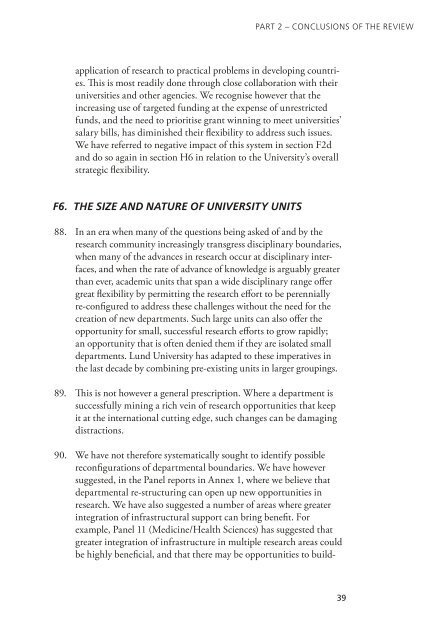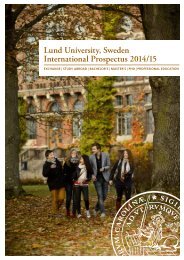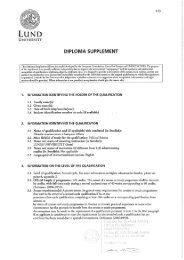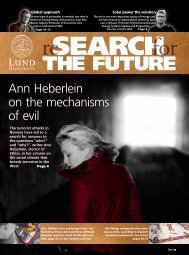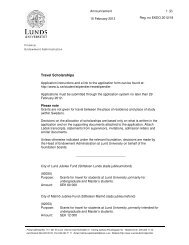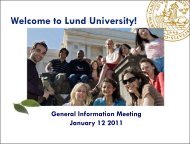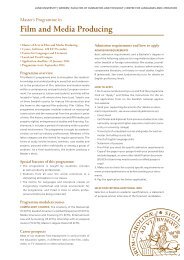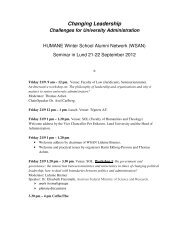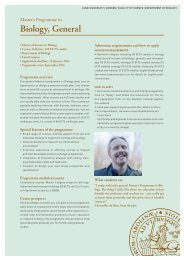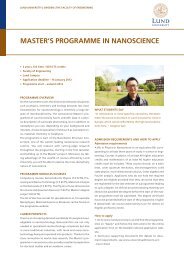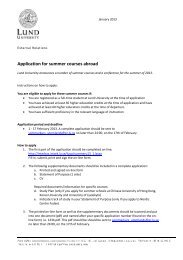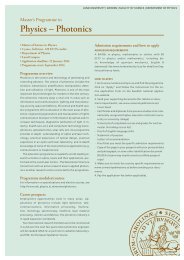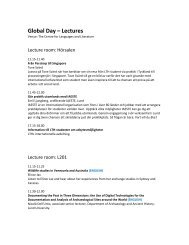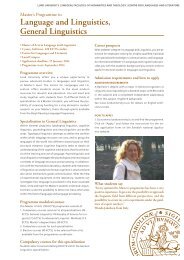- Page 1 and 2: Research Quality Assurance for the
- Page 3: CONTENTS Foreword..................
- Page 6 and 7: foreword made in a close and contin
- Page 8 and 9: foreword an extra work task they ha
- Page 10 and 11: Part 1 - background PART 1 - BACKGR
- Page 12 and 13: Part 1 - background • to assess t
- Page 14 and 15: Part 2 - Conclusions of the review
- Page 16 and 17: Part 2 - Conclusions of the review
- Page 18 and 19: Part 2 - Conclusions of the review
- Page 20 and 21: Part 2 - Conclusions of the review
- Page 22 and 23: Part 2 - Conclusions of the review
- Page 24 and 25: Part 2 - Conclusions of the review
- Page 26 and 27: Part 2 - Conclusions of the review
- Page 28 and 29: Part 2 - Conclusions of the review
- Page 30 and 31: Part 2 - Conclusions of the review
- Page 32 and 33: Part 2 - Conclusions of the review
- Page 34 and 35: Part 2 - Conclusions of the review
- Page 36 and 37: Part 2 - Conclusions of the review
- Page 40 and 41: Part 2 - Conclusions of the review
- Page 42 and 43: Part 2 - Conclusions of the review
- Page 44 and 45: Part 2 - Conclusions of the review
- Page 46 and 47: Part 2 - Conclusions of the review
- Page 48 and 49: Part 2 - Conclusions of the review
- Page 50 and 51: Part 2 - Conclusions of the review
- Page 52 and 53: Part 2 - Conclusions of the review
- Page 54 and 55: Panel 1 - law PANEL 1 - LAW CONTENT
- Page 56 and 57: Panel 1 - law detailed evaluations,
- Page 58 and 59: Panel 1 - law Great emphasis should
- Page 60 and 61: Panel 1 - law 2.5.2. Private Intern
- Page 62 and 63: Panel 1 - law strategy, and the SWO
- Page 64 and 65: Panel 1 - law In 2002-2007 seven (o
- Page 66 and 67: Panel 1 - law In the last ten years
- Page 68 and 69: Panel 1 - law contribute favourably
- Page 70 and 71: Panel 1 - law within the Faculty; c
- Page 72 and 73: Panel 1 - law researchers have bene
- Page 74 and 75: Panel 1 - law The number of doctora
- Page 76 and 77: Panel 1 - law 7. Future Potentials
- Page 78 and 79: Panel 1 - law 7.5. International La
- Page 80 and 81: Panel 1 - law Most of the law degre
- Page 82 and 83: Panel 2 - religious studies 3. Rese
- Page 84 and 85: Panel 2 - religious studies 8.1 Pre
- Page 86 and 87: Panel 2 - religious studies The lon
- Page 88 and 89:
Panel 2 - religious studies Ethics:
- Page 90 and 91:
Panel 2 - religious studies 8.5 Mos
- Page 92 and 93:
Panel 2 - religious studies recruit
- Page 94 and 95:
Panel 3 - arts PANEL 3 - ARTS CONTE
- Page 96 and 97:
Panel 3 - arts Archaeology and Anci
- Page 98 and 99:
Panel 3 - arts research areas seem
- Page 100 and 101:
Panel 3 - arts Including research f
- Page 102 and 103:
Panel 3 - arts In musicology the av
- Page 104 and 105:
Panel 3 - arts 3.6 Evaluation of fu
- Page 106 and 107:
Panel 3 - arts The multi-disciplina
- Page 108 and 109:
Panel 3 - arts The international or
- Page 110 and 111:
Panel 3 - arts Co-operation with th
- Page 112 and 113:
Panel 3 - arts a Department of this
- Page 114 and 115:
Panel 3 - arts have been commendabl
- Page 116 and 117:
Panel 3 - arts Human Ecology does n
- Page 118 and 119:
Panel 3 - arts During the evaluatio
- Page 120 and 121:
Panel 3 - arts and new thoughts. Th
- Page 122 and 123:
Panel 3 - arts is thus about the do
- Page 124 and 125:
Panel 3 - arts Research quality: Th
- Page 126 and 127:
Panel 3 - arts 7.4 Collaboration Co
- Page 128 and 129:
Panel 3 - arts a view of the presen
- Page 130 and 131:
Panel 4 - Languages / Philosophy PA
- Page 132 and 133:
Panel 4 - Languages / Philosophy pu
- Page 134 and 135:
Panel 4 - Languages / Philosophy Th
- Page 136 and 137:
Panel 4 - Languages / Philosophy Th
- Page 138 and 139:
Panel 4 - Languages / Philosophy ph
- Page 140 and 141:
Panel 4 - Languages / Philosophy th
- Page 142 and 143:
Panel 5 - BEHAVIOURAL SCIENCE proce
- Page 144 and 145:
Panel 5 - BEHAVIOURAL SCIENCE devot
- Page 146 and 147:
Panel 5 - BEHAVIOURAL SCIENCE repor
- Page 148 and 149:
Panel 5 - BEHAVIOURAL SCIENCE of th
- Page 150 and 151:
Panel 5 - BEHAVIOURAL SCIENCE As fa
- Page 152 and 153:
Panel 5 - BEHAVIOURAL SCIENCE facul
- Page 154 and 155:
Panel 5 - BEHAVIOURAL SCIENCE under
- Page 156 and 157:
Panel 5 - BEHAVIOURAL SCIENCE - Rel
- Page 158 and 159:
Panel 6 - social SCIENCEs PANEL 6 -
- Page 160 and 161:
Panel 6 - social SCIENCEs defined a
- Page 162 and 163:
Panel 6 - social SCIENCEs year each
- Page 164 and 165:
Panel 6 - social SCIENCEs 2.3 Resea
- Page 166 and 167:
Panel 6 - social SCIENCEs perspecti
- Page 168 and 169:
Panel 6 - social SCIENCEs to theory
- Page 170 and 171:
Panel 6 - social SCIENCEs The small
- Page 172 and 173:
Panel 6 - social SCIENCEs 4.5 Colla
- Page 174 and 175:
Panel 6 - social SCIENCEs 5.3 Colla
- Page 176 and 177:
Panel 6 - social SCIENCEs Partly th
- Page 178 and 179:
Panel 6 - social SCIENCEs departmen
- Page 180 and 181:
Panel 6 - social SCIENCEs 7.7 Evalu
- Page 182 and 183:
Panel 6 - social SCIENCEs 8.6 Futur
- Page 184 and 185:
Panel 6 - social SCIENCEs as, for e
- Page 186 and 187:
Panel 6 - social SCIENCEs and legal
- Page 188 and 189:
Panel 6 - social SCIENCEs aim of pr
- Page 190 and 191:
Panel 7 - ECONOMICS AND MANAGEMENT
- Page 192 and 193:
Panel 7 - ECONOMICS AND MANAGEMENT
- Page 194 and 195:
Panel 7 - ECONOMICS AND MANAGEMENT
- Page 196 and 197:
Panel 7 - ECONOMICS AND MANAGEMENT
- Page 198 and 199:
Panel 7 - ECONOMICS AND MANAGEMENT
- Page 200 and 201:
Panel 7 - ECONOMICS AND MANAGEMENT
- Page 202 and 203:
Panel 7 - ECONOMICS AND MANAGEMENT
- Page 204 and 205:
Panel 7 - ECONOMICS AND MANAGEMENT
- Page 206 and 207:
Panel 7 - ECONOMICS AND MANAGEMENT
- Page 208 and 209:
Panel 7 - ECONOMICS AND MANAGEMENT
- Page 210 and 211:
Panel 7 - ECONOMICS AND MANAGEMENT
- Page 212 and 213:
Panel 7 - ECONOMICS AND MANAGEMENT
- Page 214 and 215:
Panel 7 - ECONOMICS AND MANAGEMENT
- Page 216 and 217:
Panel 7 - ECONOMICS AND MANAGEMENT
- Page 218 and 219:
Panel 7 - ECONOMICS AND MANAGEMENT
- Page 220 and 221:
Panel 8 - medicine | clinical PANEL
- Page 222 and 223:
Panel 8 - medicine | clinical and M
- Page 224 and 225:
Panel 8 - medicine | clinical Produ
- Page 226 and 227:
Panel 8 - medicine | clinical Resea
- Page 228 and 229:
Panel 8 - medicine | clinical The u
- Page 230 and 231:
Panel 8 - medicine | clinical 2.10
- Page 232 and 233:
Panel 8 - medicine | clinical The d
- Page 234 and 235:
Panel 8 - medicine | clinical 2.20
- Page 236 and 237:
Panel 8 - medicine | clinical much
- Page 238 and 239:
Panel 8 - medicine | clinical ering
- Page 240 and 241:
Panel 8 - medicine | clinical highl
- Page 242 and 243:
Panel 8 - medicine | clinical Resea
- Page 244 and 245:
Panel 8 - medicine | clinical 831.1
- Page 246 and 247:
Panel 8 - medicine | clinical Resea
- Page 248 and 249:
Panel 8 - medicine | clinical Doing
- Page 250 and 251:
Panel 8 - medicine | clinical by Li
- Page 252 and 253:
Panel 8 - medicine | clinical (Anka
- Page 254 and 255:
Panel 9 - medicine | experimental i
- Page 256 and 257:
Panel 9 - medicine | experimental t
- Page 258 and 259:
Panel 9 - medicine | experimental w
- Page 260 and 261:
Panel 9 - medicine | experimental r
- Page 262 and 263:
Panel 9 - medicine | experimental w
- Page 264 and 265:
Panel 9 - medicine | experimental R
- Page 266 and 267:
Panel 9 - medicine | experimental V
- Page 268 and 269:
Panel 9 - medicine | experimental 5
- Page 270 and 271:
Panel 9 - medicine | experimental t
- Page 272 and 273:
Panel 10 - medicine | Laboratory ha
- Page 274 and 275:
Panel 10 - medicine | Laboratory 2.
- Page 276 and 277:
Panel 10 - medicine | Laboratory Ho
- Page 278 and 279:
Panel 10 - medicine | Laboratory im
- Page 280 and 281:
Panel 10 - medicine | Laboratory fo
- Page 282 and 283:
Panel 10 - medicine | Laboratory in
- Page 284 and 285:
Panel 10 - medicine | Laboratory 2-
- Page 286 and 287:
Panel 10 - medicine | Laboratory 2.
- Page 288 and 289:
Panel 10 - medicine | Laboratory Ma
- Page 290 and 291:
Panel 10 - medicine | Laboratory Th
- Page 292 and 293:
Panel 10 - medicine | Laboratory 3.
- Page 294 and 295:
Panel 10 - medicine | Laboratory 4.
- Page 296 and 297:
Panel 10 - medicine | Laboratory Ca
- Page 298 and 299:
Panel 10 - medicine | Laboratory c.
- Page 300 and 301:
Panel 11 - medicine | health scienc
- Page 302 and 303:
Panel 11 - medicine | health scienc
- Page 304 and 305:
Panel 11 - medicine | health scienc
- Page 306 and 307:
Panel 11 - medicine | health scienc
- Page 308 and 309:
Panel 11 - medicine | health scienc
- Page 310 and 311:
Panel 11 - medicine | health scienc
- Page 312 and 313:
Panel 11 - medicine | health scienc
- Page 314 and 315:
cannot yet be evaluated and there i
- Page 316 and 317:
Panel 11 - medicine | health scienc
- Page 318 and 319:
Panel 11 - medicine | health scienc
- Page 320 and 321:
Panel 12 - science bio/geo PANEL 12
- Page 322 and 323:
Panel 12 - science bio/geo biology
- Page 324 and 325:
Panel 12 - science bio/geo teaching
- Page 326 and 327:
Panel 12 - science bio/geo explain
- Page 328 and 329:
Panel 12 - science bio/geo ecology
- Page 330 and 331:
Panel 12 - science bio/geo for expe
- Page 332 and 333:
Panel 12 - science bio/geo Microbia
- Page 334 and 335:
Panel 12 - science bio/geo large de
- Page 336 and 337:
Panel 12 - science bio/geo Sweden,
- Page 338 and 339:
Panel 12 - science bio/geo Producti
- Page 340 and 341:
Panel 12 - science bio/geo 3.4.2 Li
- Page 342 and 343:
Panel 12 - science bio/geo whose th
- Page 344 and 345:
Panel 12 - science bio/geo impressi
- Page 346 and 347:
Panel 12 - science bio/geo Research
- Page 348 and 349:
Panel 12 - science bio/geo 4.5 Gend
- Page 350 and 351:
Panel 12 - science bio/geo scientif
- Page 352 and 353:
Panel 13 - PHYSICS / MATHEMATICS da
- Page 354 and 355:
Panel 13 - PHYSICS / MATHEMATICS se
- Page 356 and 357:
Panel 13 - PHYSICS / MATHEMATICS ex
- Page 358 and 359:
Panel 13 - PHYSICS / MATHEMATICS 2.
- Page 360 and 361:
Panel 13 - PHYSICS / MATHEMATICS Th
- Page 362 and 363:
Panel 13 - PHYSICS / MATHEMATICS 2.
- Page 364 and 365:
Panel 13 - PHYSICS / MATHEMATICS 2.
- Page 366 and 367:
Panel 13 - PHYSICS / MATHEMATICS 2.
- Page 368 and 369:
Panel 13 - PHYSICS / MATHEMATICS wi
- Page 370 and 371:
Panel 13 - PHYSICS / MATHEMATICS Un
- Page 372 and 373:
Panel 13 - PHYSICS / MATHEMATICS 3.
- Page 374 and 375:
Panel 13 - PHYSICS / MATHEMATICS 4.
- Page 376 and 377:
Panel 13 - PHYSICS / MATHEMATICS Th
- Page 378 and 379:
Panel 13 - PHYSICS / MATHEMATICS On
- Page 380 and 381:
Panel 13 - PHYSICS / MATHEMATICS 5.
- Page 382 and 383:
Panel 13 - PHYSICS / MATHEMATICS Th
- Page 384 and 385:
Panel 14 - chemistry PANEL 14 - CHE
- Page 386 and 387:
Panel 14 - chemistry remains high e
- Page 388 and 389:
Panel 14 - chemistry Faculty to PhD
- Page 390 and 391:
Panel 14 - chemistry in quality is
- Page 392 and 393:
Panel 14 - chemistry Present/future
- Page 394 and 395:
Panel 14 - chemistry in the last fi
- Page 396 and 397:
Panel 14 - chemistry synthesis of a
- Page 398 and 399:
Panel 14 - chemistry Water in Biolo
- Page 400 and 401:
Panel 14 - chemistry 2.4.7 Biopolym
- Page 402 and 403:
Panel 14 - chemistry The Panel has
- Page 404 and 405:
Panel 14 - chemistry This example o
- Page 406 and 407:
Panel 14 - chemistry 4. Department
- Page 408 and 409:
Panel 14 - chemistry from an intern
- Page 410 and 411:
Panel 14 - chemistry positions will
- Page 412 and 413:
Panel 14 - chemistry More external
- Page 414 and 415:
Panel 14 - chemistry This departmen
- Page 416 and 417:
Panel 14 - chemistry 5.7 Evaluation
- Page 418 and 419:
Panel 15 - LTH | product developmen
- Page 420 and 421:
Panel 15 - LTH | product developmen
- Page 422 and 423:
Panel 15 - LTH | product developmen
- Page 424 and 425:
Panel 15 - LTH | product developmen
- Page 426 and 427:
Panel 15 - LTH | product developmen
- Page 428 and 429:
Panel 15 - LTH | product developmen
- Page 430 and 431:
Panel 15 - LTH | product developmen
- Page 432 and 433:
Panel 15 - LTH | product developmen
- Page 434 and 435:
Panel 15 - LTH | product developmen
- Page 436 and 437:
Panel 15 - LTH | product developmen
- Page 438 and 439:
Panel 15 - LTH | product developmen
- Page 440 and 441:
Panel 15 - LTH | product developmen
- Page 442 and 443:
Panel 15 - LTH | product developmen
- Page 444 and 445:
are only 3 collaborating institutes
- Page 446 and 447:
Panel 15 - LTH | product developmen
- Page 448 and 449:
Panel 15 - LTH | product developmen
- Page 450 and 451:
Panel 15 - LTH | product developmen
- Page 452 and 453:
Panel 16 - systems science PANEL 16
- Page 454 and 455:
Panel 16 - systems science The EIT
- Page 456 and 457:
Panel 16 - systems science 5. Elect
- Page 458 and 459:
Panel 16 - systems science is highl
- Page 460 and 461:
Panel 16 - systems science Andreas
- Page 462 and 463:
Panel 16 - systems science its much
- Page 464 and 465:
Panel 16 - systems science internat
- Page 466 and 467:
Panel 16 - systems science a specif
- Page 468 and 469:
Panel 16 - systems science less mat
- Page 470 and 471:
Panel 16 - systems science 6.8 Grou
- Page 472 and 473:
Panel 16 - systems science objectiv
- Page 474 and 475:
Panel 16 - systems science in the f
- Page 476 and 477:
Panel 17 - LTH | Building PANEL 17
- Page 478 and 479:
Panel 17 - LTH | Building Departmen
- Page 480 and 481:
Panel 17 - LTH | Building 2.3 Resea
- Page 482 and 483:
Panel 17 - LTH | Building 3. DEPART
- Page 484 and 485:
Panel 17 - LTH | Building Networkin
- Page 486 and 487:
Panel 17 - LTH | Building groups do
- Page 488 and 489:
Panel 17 - LTH | Building should be
- Page 490 and 491:
Panel 17 - LTH | Building in good i
- Page 492 and 493:
Panel 17 - LTH | Building 5.7 Futur
- Page 494 and 495:
Panel 17 - LTH | Building Productiv
- Page 496 and 497:
Panel 17 - LTH | Building 7. ELECTR
- Page 498 and 499:
Panel 17 - LTH | Building 7.5 Resea
- Page 500 and 501:
Panel 17 - LTH | Building place in
- Page 502 and 503:
Panel 17 - LTH | Building 9. SUMMAR
- Page 504 and 505:
Panel 17 - LTH | Building Technolog
- Page 506 and 507:
annex 2 - membership of the review
- Page 508 and 509:
annex 2 - membership of the review
- Page 510 and 511:
annex 2 - membership of the review
- Page 512 and 513:
annex 2 - membership of the review
- Page 514 and 515:
annex 3 - panel structure Panel 7 -
- Page 516 and 517:
annex 4 - terms of reference ANNEX
- Page 518 and 519:
annex 4 - terms of reference report
- Page 520 and 521:
annex 4 - terms of reference is of
- Page 522 and 523:
annex 4 - terms of reference Gender
- Page 524:
524


